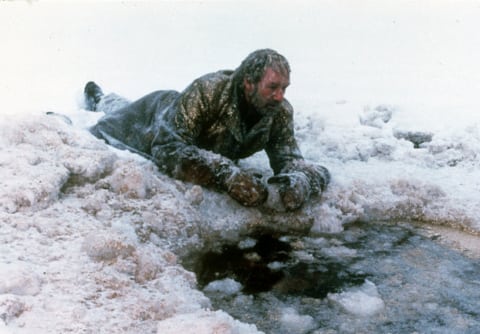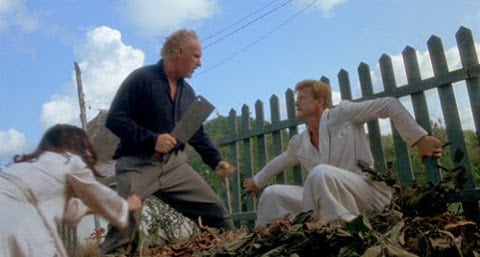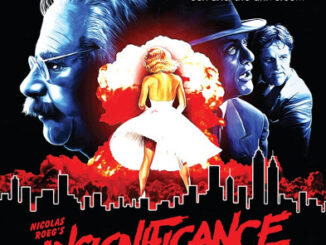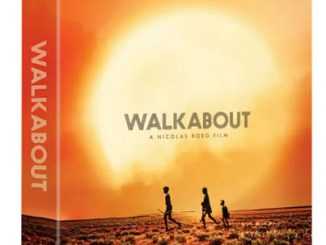Eureka (1983)
Directed by: Nicolas Roeg
Written by: Marshall Houts, Paul Mayersberg, Robert W. Service
Starring: Gene Hackman, Jane Lapotaire, Rutger Hauer, Theresa Russell
UK/USA
AVAILABLE ON DUAL FORMAT BLU-RAY AND DVD: 21ST MARCH, from EUREKA ENTERTAINMENT
RUNNING TIME: 130 min
REVIEWED BY: Dr Lenera, Official HCF Critic

1925. Prospector Jack McGann, who turns down partnerships with others by telling them he has “never earned a nickel from another man’s sweat”, has been searching for gold in the Canadian wilderness and has so far come up empty. However, a chance encounter with a rock which seems to come down to him from space, and Frieda, a fortune teller with supernatural powers, lead hin to “rape the earth” and strike it rich. 1940. Jack lives in his great house on the island he owns in the Caribbean. He’s the wealthiest man in the world, but his life has lost meaning. Saddled with an alcoholic wife, Helen, his only care seems to be his coddled daughter Tracy, whose playboy boyfriend Claude Jack hates. Then there’s the matter of mob boss Mayakovsky, who wants to build a casino on the island….
I was never really sure about this ambitious, fascinating but, I think, hugely flawed Nicolas Roeg outing. As a fan of much of the director’s work when I was relatively young, especially of course his stunning five film run from Performance [co-directed with Donald Cammell] to Bad Timing, Eureka was one of two Roeg outings [the other being Insignificance] that I can say bored me somewhat upon first viewing and I’ve only watched it twice since. Viewed with more mature eyes, there’s so much that’s interesting about the movie that boredom certainly wasn’t something I felt. The strange meditation of life and success, which deals with some important but not often depicted questions such as what happens after we get what we want, has moments that rival Roeg’s best work, some of the best acting that can be found in his films, and really does provide a lot of food for thought that may stick with you long after you’ve seen it, but I still found it rather awkward, with some stuff that just doesn’t really work, as if a very good film dealing with some lofty themes is doing battle with an average true-life drama. Still, there’s a great deal to admire, if not so much to enjoy.
The inspiration for Eureka was the book Who Killed Sir Harry Oakes?, in which writer Marshall Houts investigates the factual killing of American-born British/Canadian Harry Oakes, who earned a fortune in Canada and moved to the Bahamas where he was killed under mysterious circumstances, followed by an inconclusive trial. Houts proposed the theory that notorious mob boss Meyer Lansky was behind the murder. Screenwriter Paul Mayersberg had had another filmmaker come to him with the book with interest in filming it two years before Roeg raised the idea. What was initially called Murder, Mystery was a very true to life telling of the story, with everyone called by their real names. After much legal discussion, Roeg and Mayersberg decided to change some of the details and add certain elements, such as an element of the occult. Eureka was a big production and was shot in Twickenham Studios, Miami, Jamaica, and in the Yukon country, partly on top of Mt. Williams because there wasn’t enough snow elsewhere, and partly in the historic mining town of Barkerville. However, MGM kept wanting to shut production down, not liking what they saw, and the 1981-shot picture wasn’t released until 1983, partly because few seemed to understand or like it, and partly because it was made during a change of management at MGM. The 1983 release only reached a few cities in the UK and the US, and the film was little seen thereafter. There was a UK video release, but it cut some shots from the central murder.
Eureka begins with two men squabbling in the snow, seemingly, though in actual fact not entirely [though the details remain vague] over a woman, and one thing that really did strike me, remembering as I did bits and pieces of the film from my two earlier viewings, is how cleverly, even meticulously, structured, some elements of the story seem to be, with lots of foreshadowings of later events and lots of visual and narrative motifs that are repeated, a good example being this opening fight, which is later echoed in Jack and Claude battling over Tracy. It’s a peculiar feature of this highly eccentric picture that an enormous amount of care has been taken over some things, yet in other places it’s something of a mess. The first half hour of Eureka really is quite superb though. Jack’s walk through the virtually abandoned town has a haunting feel and climaxes with a rather random, but unsettling, bit where a seemingly insane man blows his own brains out. Jack’s visit to a boarding house/brothel utilises odd edits and choices of shots to effectively show how Jack feels. Frieda’s monologue to Jack about her ex-boyfriend, who was also called Jack, is rather touching, if overdone. And then we get the brilliant sequence where Jack finds gold, with superb cinematography, punchy editing, convincing special effects and the use of the wonderfully atmospheric opening to Wagner’s Der Reingold [which was also well utilised in Nosferatu The Vampyre and The New World] all coming together to create a scene of tremendous and almost religious power as a great gush of liquid gold overwhelms Jack and sends him back up to the surface, breaking through the ice like a newborn baby, representing his financial rebirth.
Then the scene shifts to 15 years later, in a superb cut from a blazing fire in the background of where Frieda is dying before Jack, to the spark of an outdoor fire where the older Jack and his daughter Tracy are seemingly in almost the same location. Much of the rest of the film then takes place on Jack’s Caribbean island, and it does go down a few notches after that terrific first quarter. A lot of time is spent on the odd love triangle that comprises of Jack, Tracy and her disreputable boyfriend Claude, whom Tracy has actually married in secret. The relationship between Jack and Tracy seems to have incestuous undertones. There are some very powerful scenes involving the three, but the emphasis on this element of the story detracts from the more suspenseful stuff about big business and the Mafia wanting Jack’s island for their own purposes, which remains almost as vague as the machinations of those nasty corporations in Roeg’s The Man Who Fell To Earth but could have done with more explanation in this more realistic [well, up to a point] tale. Eventually we get the murder, and it’s a really grim affair [think blowtorches], close to something you may find in a Lucio Fulci film. The true climax of the film though takes place in a courtroom where Claude and Tracy confront each other amidst much histrionics from Tracy and a complete disregard for courtroom procedure. It’s quite emotional and exhausting, with some barnstorming acting from the typically stunning Theresa Russell, but not really very convincing.
Certain fleeting flashbacks, sometimes to things that we don’t know what they’re really of, frequent cuts to things like the Moon, shots that take us inside globes, and a salacious voodoo dance set piece which comes out of nowhere, remind the viewer that he or she is watching a Roeg film, though this was the first of his pictures to contain far less of the elliptical editing that had become his trademark, though it’s still hardly a conventional picture. There’s plenty that doesn’t really make much sense but provides odd flavour [the mysticism/occult aspect, for example, which in terms of narrative only really adds to the tale by having Jack being partly led to the gold by supernatural forces then him entirely finding it himself], while the film’s many ideas, such as that we may pay the price for getting what we want, the question of what part of success is really important, and that we can never recapture the moment where we find that our life has meaning [similar nostalgia for a bygone time exists in other Roeg movies], really give it tremendous weight. The result is rather cold and distant though, with the result that what could have been, and almost does seem on the verge of succeeding at being at times, a truly penetrating as well as heartbreaking examination of the human condition, just falls short. Take Jack. He’s such an interesting figure, but he remains at arm’s length. I understand what I think are the story’s major themes, but I don’t much understand Jack. I felt I understood, and therefore sympathised with, David Bowie’s Thomas Jerome Newton more after even my first watch of that 1976 film, and he was an alien.
Gene Hackman, mostly wearing very realistic older age makeup, struggles gamely to make Jack into a real person. Russell, whose character does some inexplicable things, and Rutger Hauer adopt differing acting styles which makes their scenes together work even though many of them are the least interesting scenes in the film and strain for a significance which doesn’t really appear to be there. Joe Pesci and Mickey Rourke have some of the best moments as two mobsters who are respectively Italian and Jewish. Their scenes have a vitality lacking in much of the rest of the film and I wish we’d seen more of them. Cinematographer Alex Thompson does an expert job with the employment of several different styles of photography throughout the film, while the music score by the perennially underrated Stanley Myers is mostly understated but contains some fine pieces including an effectively bittersweet piece heard several times but most prominently during the end credits. Here, Myers perhaps gets close to what Roeg and Mayersberg were trying to say about the human condition. Eureka is a highly uneven, disjointed and even frustrating work which I don’t think its creators really got a handle on. There’s some great stuff in it though, as well as a lot of truth, so I don’t feel that, despite criticising it a fair bit, I’ve overrated it by scoring it seven out of ten.
Eureka Entertainment bring Eureka to Blu-ray in a very fine transfer which handles the various types of cinematography employed in the film very well. Grain [I’m one of those who likes grain, unless it’s excessive] is well managed and has quite a bit of depth. I listened to twenty minutes of the Roeg interview that he gave at Eureka’s premiere at the National Film Theatre, which plays alongside the film, and it seemed very interesting if containing some gaps [I’m guessing that the interview isn’t as long as the movie]. I also switched on Mayersberg’s talk about the film and ended up watching the almost hour-length chat. I was most gratified that some of the things I picked up on in the film were intended [interpretation can be a funny thing]. Overall this release is a fine package for such an obscure film.
SPECIAL FEATURES
*High-definition digital transfer
*Subtitles for the deaf and hard-of-hearing
*Audio recording of Q&A with Nicolas Roeg at the world premiere
*Exclusive new interviews with producer Jeremy Thomas, writer Paul Mayersberg and editor Tony Lawson
*Isolated music & effects track
*Theatrical trailer
*PLUS: A booklet featuring a new essay by Daniel Bird, a reprinted interview with Roeg, an excerpt from Roeg’s autobiography and Robert W. Service’s poem ‘The Spell of the Yukon’








This is a film I’ll need to revisit soon. I remember the moment when Hackman’s character finds gold as particularly stunning and the blowtorch scene was repugnant. The whole project left me a little disorientated and bemused. It has all the elements of a wonderful film but does not quite make it? At least it has wonderful moments. Great review.
I think that your comment ‘It has all the elements of a wonderful film but does not quite make it’ perfectly sums Eureka up. If you’re anything like me, than you’ll find that it improves somewhat when seen through ‘older/more mature’ eyes.